Cai Jindong: How do Chinese music enter the Western world?丨 丨 东西 东西
Author:China News Weekly Time:2022.07.14

Through the mutual influence of Chinese and Western music
People with different cultures can understand each other
China News Agency reporter: Sha Yanting
Number of full text: 2554
Estimated reading time: 9 minutes
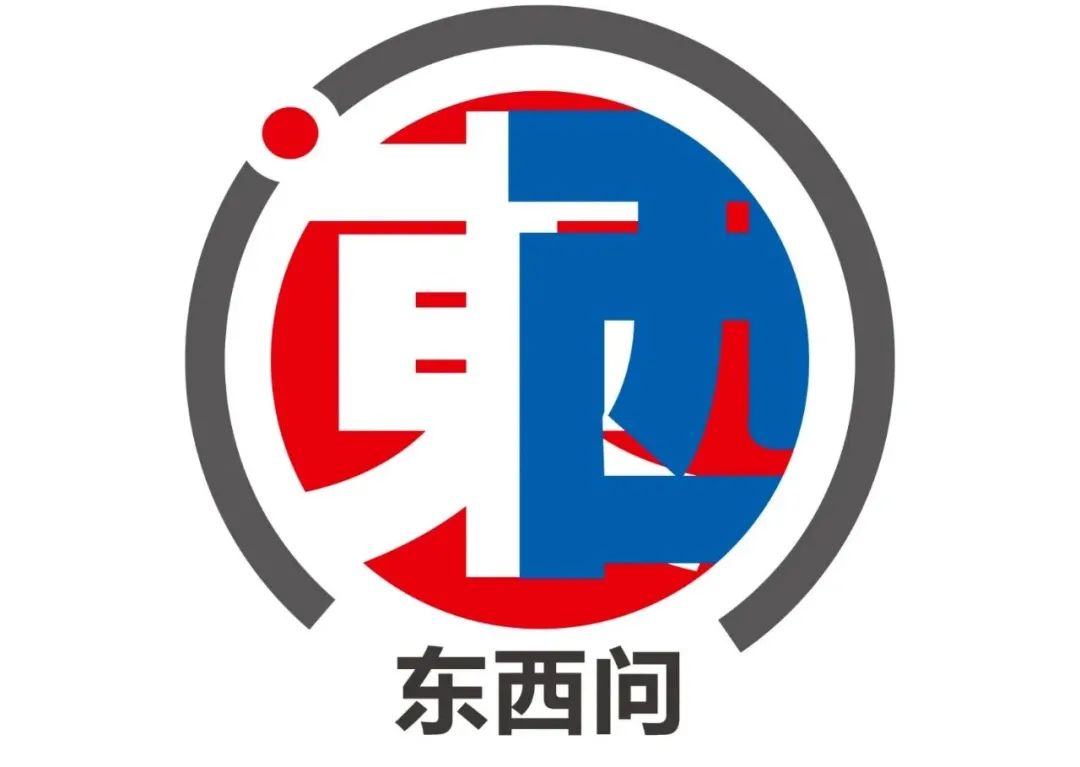
In recent years, with the deepening of Chinese and American cultural exchanges, Chinese music has gradually entered the vision of American audiences. In 2018, Bud College, one of the top music colleges in the United States, opened the first Chinese music project in the Western world. What is the acceptance of Chinese music with Chinese music? How to promote Chinese music in the Western world? Cai Jindong, the president of the Bud College Meizhong Music Institute and the famous conductor Cai Jindong, recently accepted an exclusive interview with China News Agency's "East and West Questions" in Washington.
The interview is currently recorded as follows:
China News Agency: As a well -known conductor in the Western music industry, can you talk about your personal experience? What kind of motivation allows you to go to Chongyang on the road to learning Western music?
Cai Jindong: My music career has been in half a century. In retrospect, it seems like a big rotation, starting with Chinese music, then entering Western music, and finally starting to reconnect and develop Chinese music. I accidentally came into contact with the violin in the 1960s and later began to touch Western music. What had a great impact on me was that in 1979, Carrajan led the Berlin Philharmonic Orchestra and Ozawa to lead the Boston Symphony Orchestra to China. I watched the performance at the scene and felt the strong shock from the music that had never been from the music. Since then, I have decided to be a command, and at that time, the learning command needed to go to the West.
My development was very lucky. When I was reading a doctorate, because the conductor was suddenly ill, I had the opportunity to board the stage of Lincoln Center in New York as the command assistant to direct Mozart's opera "Zais". The performance gives a high evaluation. This incident makes me confident. As an artist at different stages of life, this spiritual support is very important, and self -confidence directly affects the path of music development.
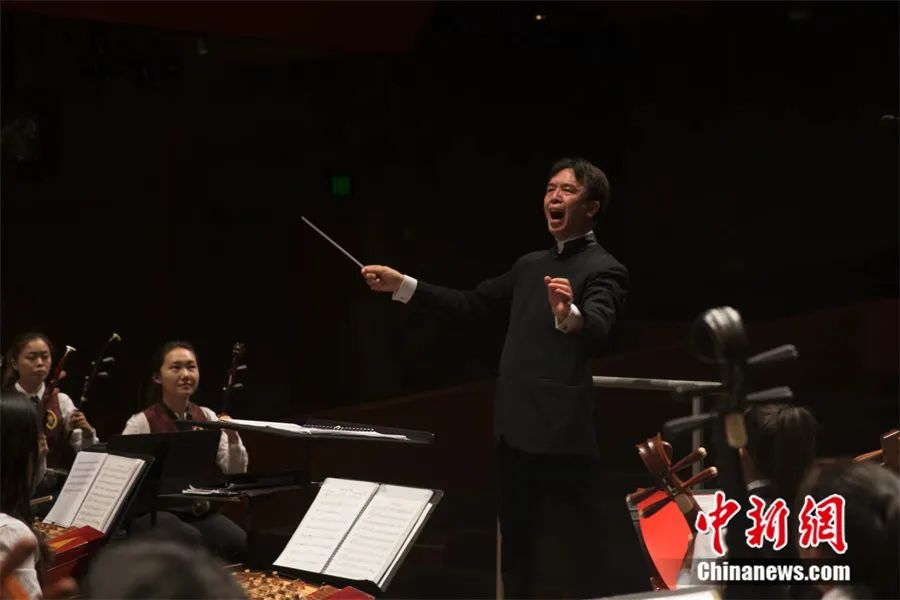
On August 24, 2018, the Bad Youth Middle School held a Chinese private concert at the Fisher Performance Art Center of Bud College, New York to perform classic Chinese ethnic music such as "Fengyang Flower Drum" and "Chunjiang Flower Moon Night". Cai Jindong, the dean of the Chinese Music Institute, served as the command. China News Agency reporter Liao Pan Photo
China News Agency reporter: For ordinary audiences, traditional Chinese music is very different from Western classical music. What do you think of the differences between Chinese and Western music, is there any common point?
Cai Jindong: I think music is similar. As an emotional expression, music does not need any language explanation. There are indeed differences between Chinese music and Western music. Chinese music pays more attention to the relationship between music and nature, and man is part of nature. Chinese music has almost no title music, and always associates with mountains, water, literature or art other than music. The characteristics of Chinese music often tell stories with music.
Western music pays more attention to the connection between music and personal and more self. Each composer has its own musical personality and does not want to join the music narrative with things other than music, so there are title music, such as the D major violin concerto and the B major symphony. However, I think that although the composer does not want to connect music with other things, any composer is inseparable from the society he lives, so music will reflect the society or individual's perception of society anyway.
After entering the 21st century, many East and West music mixed together. At present, Western composers rarely write the D minor concerto, and there will always be a title, and only music can no longer satisfy his narrative. Chinese music is affected by Western music and is fuller in harmony and structure. Both music is developing, to a certain extent.
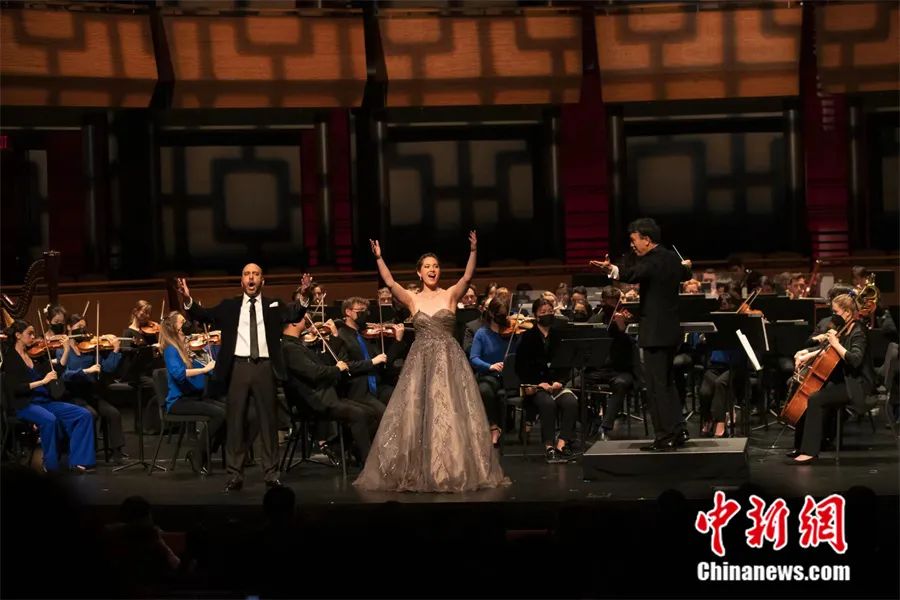
On January 30, 2022, the US -China Music Institute of Bad Music University in New York held the third "Spring Voice" Chinese New Year Concert at the Lincoln Center Jazz Center to present Chinese New Year music for New York audiences. China News Agency reporter Liao Pan Photo China News Agency: What do you think of Westerners' awareness and acceptance of Chinese music? Has it improved in the past few decades?
Cai Jindong: In the past, the West's understanding of Chinese music was very shallow. Western music has dominated the world in the past 200 to 300 years. In recent years, with the economic development of Asia and China, the West has become more interested in Chinese culture. Over the past few decades, China has trained a lot of outstanding artists in the Western music industry, making Westerners start thinking about reasons and began to figure out what role played music in Chinese society.
I have been in the United States for more than 30 years and witnessed the changes in American society and Chinese music. This rapid process is interesting. When I first came, Americans didn't know what Pipa and Erhu were, and they didn't understand Chinese music at all, and now pipa concerto and erhu concerto are very common. The Symphony Orchestra of major American cities holds the Chinese New Year Concert every year, and there are many Chinese theme -related music festivals. Americans' understanding of Chinese music will continue to deepen through these. Maybe it is not used to it at first, but after getting used to it, it will find its uniqueness. As long as the performance level is high and the music is innocent, the audience can feel it. Any form of music or art, if there are hundreds of years, thousands of years, must have its artistic value and social value.
On January 30, 2022, the American -China Music Institute of Bad Music at the New York School of Music held the third "Spring Voice" Chinese New Year Concert at the Lincoln Center Jazz Center. China News Agency reporter Liao Pan Photo
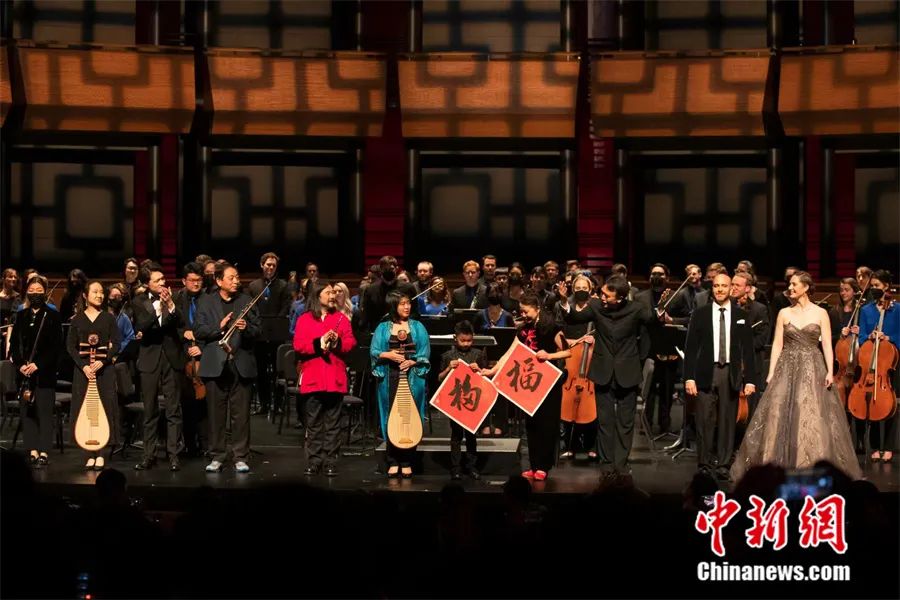
Reporter of China News Agency: You are committed to promoting Chinese music in the West, including the establishment of Chinese folk music projects in Bud College. What role do these projects play a role in promoting Chinese music in the United States? How to make Chinese music better into the West?
Cai Jindong: We have established the American and China Music Institute at the Bad College. The purpose is to bring Chinese music to the West, and at the same time combine with Western music to create a new form of music. In 1927, Cai Yuanpei and Xiao Youmei established the first Chinese Academy of Music in Shanghai in Shanghai, attracting young people in China at that time to come to Shanghai to cultivate the first batch of important Western music figures in China, including Li Delun, He Lingting, Xing Xinghai, etc. Essence Today, the Bud American Music Institute opened the first project in the Western world to learn Chinese instruments as a professional and degree. This is actually equivalent to in turn to put Chinese music in Western society. I hope Bud can become a base for Chinese music in the western world, and people who are interested in Chinese music in the United States and Western Chinese music will slowly join.
At present, American students have already learned Chinese folk music, including Pipa and Erhu. Pipa and erhu are Chinese instruments, but they cannot be said that they are just Chinese musical instruments. They are appliances that express music, and anyone can use them to express their music. The Western Orchestra has also developed like this. Mozart has added the clarinet to its band, and Beethoven has put the long number in the symphony for the first time. I believe that Chinese instruments can gradually become part of the symphony band in the 21st century.
The American students of the Bud Youth Band are playing Erhu. China News Agency reporter Liao Pan Photo
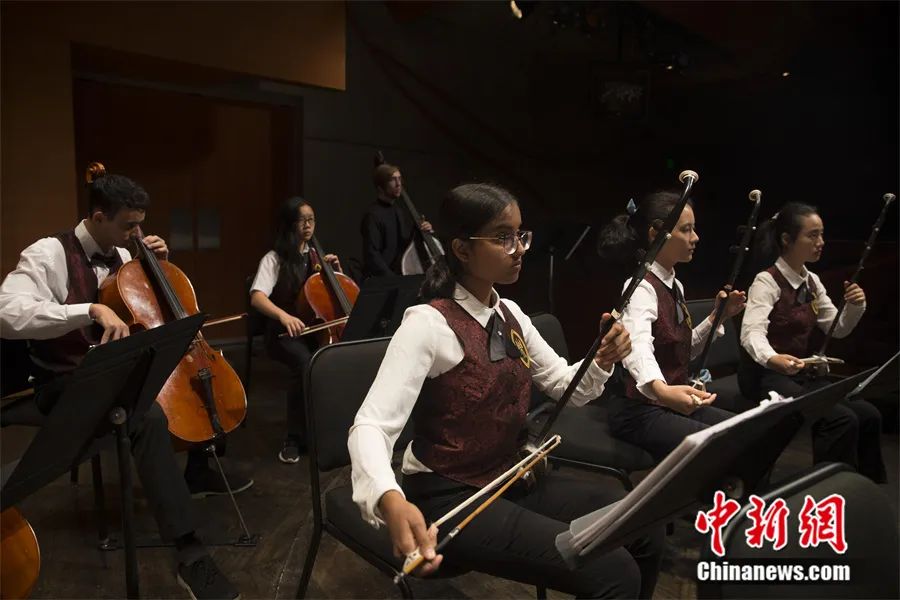
Reporter of China News Agency: In recent years, many outstanding Chinese musicians have emerged in the western classical music industry, including composers and performers. In your opinion, how will the emergence of these oriental holes in the western classical music industry have an impact?
Cai Jindong: In the past 30 years, Chinese musicians have contributed a lot of fresh blood to the world's classical music. Chinese performers can change their interpretation of Western music to some extent. They will infiltrate the Chinese personality, culture, and educational background into the interpretation of Beethoven and Tchaikovsky. Pianist Fu Cong once said that his Chinese cultural foundation helped him analyze and understand Chopin's works, which can have different levels and unexpected effects. Music is a special form of art. The things on the music score are not music. Only turning music into sound is music. Whether it was 100 years ago or today's musicians watching the same music score performance, but 100 years ago, it was almost impossible to perform exactly like today. Music is a living art form. It is always regenerating, and the addition of Chinese musicians will make this regeneration and create a new level.
In addition, in the past 30 years, a number of outstanding composers have appeared in China, such as Tan Dun, Zhou Long, Chen Yi, etc. As far as composers and works of the 21st century are concerned, Chinese composers are no longer marginalized, but have become an important part of the development of classical music in the world.
In 2016, Tan Dun, an internationally renowned conductor and composer, held a speech interactive concert in the "Dunhuang Restaurant" speech in New York. It reappeared the Dunhuang music sound to New York's audience thousands of years ago and demonstrates China's Dunhuang culture. The picture shows Tan Dun's live "Jiqin" (predecessor of erhu).
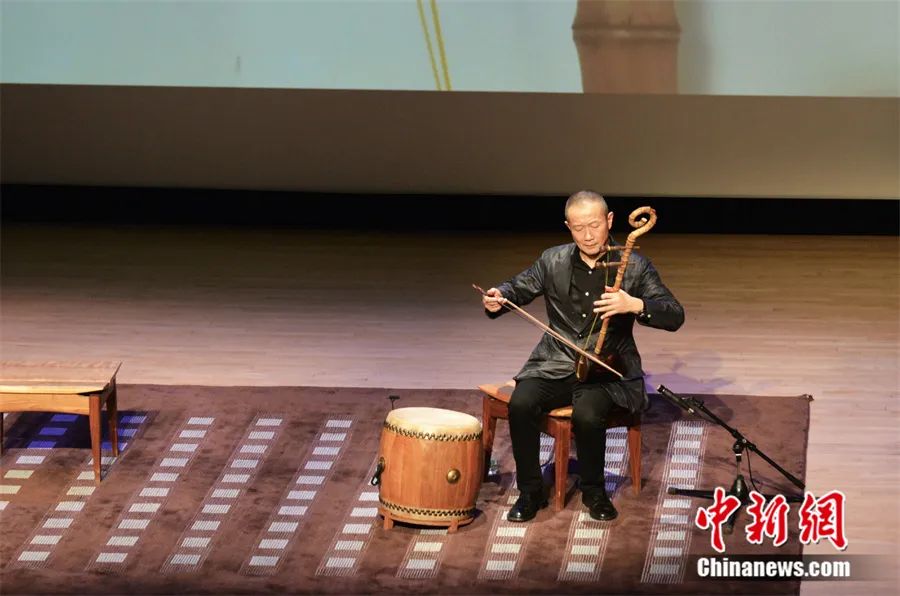
China News Agency reporter: Music is the carrier of culture. What role do you think music plays in promoting Eastern and Western cultural exchanges and cultural integration?
Cai Jindong: Music is an international language and people's feelings of sound. No matter what cultural background, they can feel the same emotions. Love and sadness can be reflected in music with different cultural backgrounds. Music is an important means to contact people. Through the mutual influence of Chinese and Western music, people in different cultures can understand each other. With the development of the world's political and economic development, the marginal music has also begun to be understood. The art world has undergone such changes, and the communication of art will make the world more integrated. Introduction to the interviewee:
Cai Jinsong was born in Beijing in 1956. He went to the United States to study music in the 1980s, and received a master's and doctoral degree at the New England Academy of Music and the Cincinnati Conservatory of Music. He is currently the dean of the Badami Music Institute, the artistic director of the New York China Contemporary Music Festival, and the Professor of Music and Art of Bad College. He has been a professor of music performances at Stanford University for many years. For more than 30 years, Cai Jindong has become one of the most influential Chinese conductors in the Western music industry. He has won the Modern Music Award of the American Writer and Composer Association three times, and he has a lot of well -known American Symphony Orchestra and most of the top Chinese symphony orchestra. Essence He and his wife Sheila Melvin's "Red Rhapsody -Western Music in China" and "Beethoven in China" attracted widespread attention worldwide. Cai Jindong has been committed to promoting the spread of Chinese music and works in the United States for many years, and is a pioneer and pioneer of Chinese music in the West and the world.
Text Editor: Xu Crown
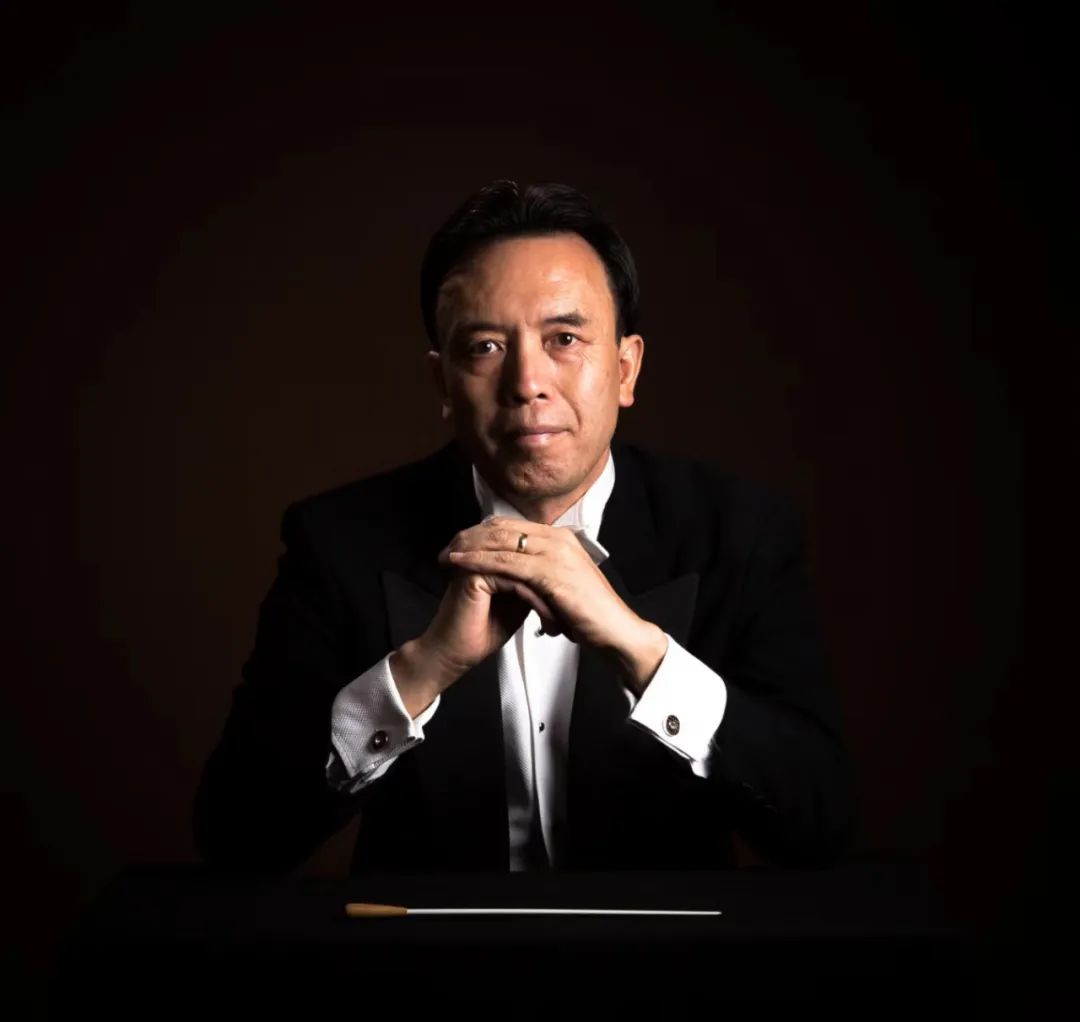
Image editor: Sudan
- END -
Construction of the mobile socialized Internet phase communication effect evaluation index system
Author: Liu Jianming (Professor of the School of Grammar, Wuhan Donghu College, professor of the School of Journalism and Communication of Wuhan University, researcher at Wuhan University Media Develo
Poetry and painting Jiangnan · Vitality Zhejiang 丨 Hai Fei: Jiangnan is hidden in the pen, from time to time

Zhejiang News Client reporter strict grainsIn your eyes, what does Zhejiang look l...